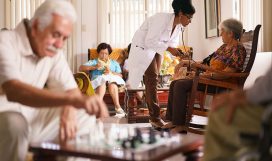NUTRITION AND HEALTHY AGING
Increasing scientific, clinical, and social interest helps us understand the relationship between nutrition and aging. Eating well is essential in all stages of life but is especially important for maintaining good health and slowing the aging process in older adults. Nutrition influences the risk of contracting acute and chronic diseases and affects the physiological and biological processes of aging. Making healthy food choices also has social impacts, since healthy adults are more productive members of society and utilize fewer resources on multiple levels than unhealthy adults.
The outcome of this course is for the learner to identify and describe the nutrient needs specific to the older adult, common age-related changes that impact nutritional status, nutrition-related diseases common in older adults, the impact of food-borne illnesses on the health of aging adults, the United States’ governmental MyPlate food guidelines, and the purpose of the Older Americans Nutrition Program (OANP).
THE HEALTHY AGING BRAIN
The brain is the most complex part of the human body. People once believed that progressive mental decline was inevitable, but now we know that the brain’s ability to age well varies from person to person and is affected by genetic predisposition, genes, life experiences, lifestyle, exposure to toxins and chemicals, accidents, trauma, and disease. Cognitive abilities do not automatically decline with age. The majority of older adults are happy. They live an active, optimistic life with many friends and they engage in leisure-time activities that increase not only their quality of life but also their longevity and the health of their brains.
The outcome of this course is for the learner to describe the components of the brain and their functions; the current theories of neuroplasticity, neurogenesis, and epigenetics; and the effects of physical activity, nutrition, mental stimulation, socialization, creativity, attitude, spirituality, and meditation on the healthy aging brain.
PHYSICAL ACTIVITY AND HEALTHY AGING
Physical activity is essential for healthy aging and well-being. Throughout life, engaging in enjoyable movement, such as walking, dancing, golfing, swimming, and cycling can increase the chances for health and vitality in later years.
The outcome of this course is for the learner to describe the physiological and psychological benefits of physical activity, various types of physical activity and their health benefits, the factors of an effective exercise program, and the benefits of movement (walking, yoga, and tai chi).
CENTENARIANS: KEYS TO LONGEVITY
Living to be 100 years old was once considered a rare occurrence, but with advancements in medicine and lifestyle changes, living to be 100 is not so improbable today. As a group, there are more centenarians worldwide than ever before, with the largest concentration found in the United States. Five places have been identified worldwide where people live the longest, healthiest lives. These “Blue Zones™” where people reach 100 years of age at significantly higher rates include the Barbagia region of Sardinia in Italy, Okinawa in Japan, the Adventist community of Loma Linda in California, the Nicoya Peninsula in Costa Rica, and the island of Ikaria in Greece. The people living in these places have achieved longevity through different paths and different cultures.
The outcome of this course is for the learner to describe the epidemiology and psychosocial dynamics of centenarians, the genetic factors that contribute to longevity, and the nine lessons learned from the Blue Zones.
INTIMACY, SEXUALITY, AND HEALTHY AGING
Loving and being loved are essential to maintaining a positive, healthy attitude. Quality of life is often related to affection and tenderness shared with loved ones. With a healthy self-esteem and a willingness to communicate with a partner, older adults can enjoy intimate relationships throughout their lives.
The outcome of this course is for the learner to describe the importance of intimacy and sexual needs; normal sexual changes in the aging adult; the pathological conditions affecting sexuality; and lesbian, gay, bisexual, and transgender sexual issues as they relate to getting older.
BEHAVIORAL AND MENTAL HEALTH IN AGING
In the United States and globally, the population is aging rapidly. The need for geriatric behavioral and mental health services will also increase dramatically. Mental health and well-being are important for older adults as at any other time of life. Continued intellectual, social, and physical activity throughout the life cycle are important for the maintenance of mental health in later life. This course explores the issues of behavioral and mental wellness strategies for the older adult, cultural diversity as it relates to behavioral and mental health, and integrative therapies to support mental health in the aging population.
The outcome of this course is for the learner to describe the factors related to behavioral and mental health promotion and wellness, culturally competent treatment, strategies, therapies, and services directed at improving the mental health of the older adult.











